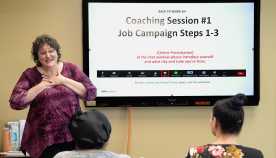About Us
This year marked the 30th anniversary of the passage of the Americans with Disabilities Act (ADA). AARP Foundation attorneys have been involved in many cases enforcing the ADA in areas of employment, housing, transportation, public accommodations, and access to government services.
One issue that may reach the Court is whether the United States Department of Justice (DOJ) has standing to enforce Title II of the ADA. The Eleventh Circuit recently ruled that Title II’s enforcement section refers to related statutes that grant the Attorney General standing to file suit to enforce the ADA’s provisions against states. United States v. Florida, 938 F.3d 1221, 1250 (11th Cir. 2019). The DOJ opposes Florida’s petition seeking rehearing en banc in United States v. Florida. No. 17-13595 (Oct. 29, 2019). DOJ has been effective in bringing lawsuits to enforce the rights of people with disabilities, particularly following the United States Supreme Court’s decision in Olmstead v. L.C. ex rel. Zimring, 527 U.S. 581 (1999), which was a landmark decision construing the ADA’s integration mandate. DOJ’s Olmstead litigation and resulting settlements have produced meaningful change for people with disabilities across the United States. If the Eleventh Circuit affirms its ruling on DOJ’s standing, Florida might seek resolution of the matter at the Supreme Court in the coming year.


You have the power to change the lives of seniors in poverty
1 in 3 older adults struggle to meet their basic needs. Your gift can help seniors secure good jobs, get the benefits they've earned, and stay connected to their communities.
Whether ADA claims against long-term care providers, particularly assisted living facilities, are subject to arbitration is another issue being litigated in the federal appellate courts. See Stiner v. Brookdale Senior Living, Inc., 810 Fed. Appx. 531 (9th Cir. 2020). In Stiner, California residents of Brookdale-operated assisted living facilities litigated a putative class action alleging that Brookdale’s facilities are inaccessible and that its policies discriminated against people with disabilities. Id. at 533. Brookdale sought to compel arbitration of two of the eight named plaintiffs’ claims. Id. The Ninth Circuit held that the plaintiffs’ claims under the ADA “do not rest upon the residency agreement” and, therefore, the plaintiffs could not be compelled to arbitrate these claims under principles of equitable estoppel. Id. at 535. If Brookdale seeks review of this decision and the Court agrees to take the case, there could be broad implications for disability-based challenges to the operation of assisted living facilities throughout the country.


















